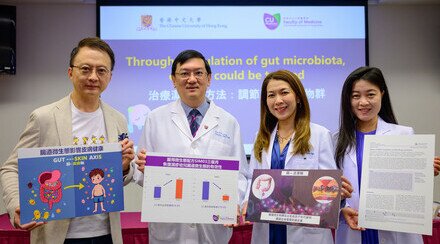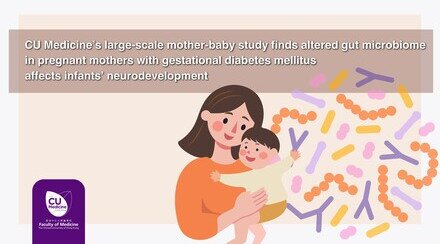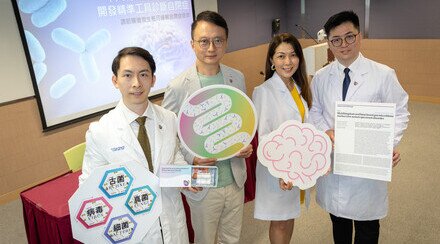CU Medicine develops novel microbiome technology MOZAIC for faecal microbiota transplantation; Enhancing treatment success for Clostridioides difficile infections to over 90%
Clostridioides difficile infection (CDI) is a common hospital-acquired infection worldwide. Recurrence and mortality rates have been reported to be up to 35% and 40%, respectively. Faecal microbiota transplantation (FMT), which involves taking healthy bacteria (microbiota) from the faeces of a carefully screened donor and transferring them to the colon of the recipient, has emerged as a useful approach to treating patients with refractory or recurrent CDI. Some hospitals in Europe and the US have offered FMT in the past few years. However, the numbers of FMT procedures performed remains limited, and success rates in treating CDI vary from 40% to 80%. There is also a lack of well-defined standards for donor screening, stool storage, best practice protocols and long-term safety profiles.
Since 2013, the Faculty of Medicine of The Chinese University of Hong Kong (CU Medicine) has been conducting research on FMT in patients with recurrent CDI and other diseases at the Prince of Wales Hospital. To date, it has performed over 800 FMT procedures. In 2020, the Microbiota I-Center (MagIC) of CU Medicine, funded by the InnoHK initiative of the Hong Kong government, developed a novel technology, MOZAICTM (Multi-kingdom OptimiZAtIon for microbiota Consortia), to improve the clinical outcome of FMT. The success rate is over 90% in patients with recurrent CDI. In addition, patients’ median survival doubled from 2.1 to 4.7 years.
This patented technology has been adopted by the local health authority, the Hospital Authority (HA), to provide a territory wide FMT service to patients in public hospitals in Hong Kong.

Microbiota I-Center (MagIC) of CU Medicine, funded by the InnoHK initiative of the Hong Kong government, developed a novel technology, MOZAICTM, to improve the clinical outcome of Faceal Microbiota Transplantation (FMT). CU Medicine uses this patented technology to treat all Hospital Authority (HA) patients suffering from recurrent CDI. (From left) Professor Margaret Ip, Chairperson of the Department of Microbiology at CU Medicine; Dr Rashid Lui, the HA’s FMT Service Coordinator; Professor Siew Ng, Director of MagIC; and Professor Francis Chan, Dean of CU Medicine.
The microbiota stool bank of CU Medicine is aligned with the standard of the UK Birmingham FMT Centre, which is the first Medicines and Healthcare products Regulatory Agency (MHRA) licensed facility in the UK to provide FMT for clinical trials and to treat of patients with recurrent and refractory CDI.
Incidence of CDI in Hong Kong has increased by more than 3 times
The incidence of CDI in Hong Kong continues to rise. In 2006, there were approximately 15 cases per 100,000 adults; by 2019, the number had increased to 54 cases. Approximately 3,600 patients in Hong Kong suffered from CDI in 2022. Elderly people, those with chronic diseases or inflammatory bowel disease, and frequent antibiotic users are at high risk of CDI.

Professor Sun Dong, Secretary for Innovation, Technology and Industry, Hong Kong government, states that InnoHK is the Government’s I&T flagship initiative that aims to elevate Hong Kong into a global innovation powerhouse. Currently, there are 29 research centres, of which MagIC is one of them. He is confident that the InnoHK research centres will continue to deliver high quality R&D outcomes, translating their research excellence into practicable applications for the betterment of humanity and the society.

Mr Henry Fan, Chairman of HA says that it is a breakthrough to apply FMT technology to treat patients with CDI. HA, as a user, has formed a task group to prepare for introducing this new technology.
Professor Margaret Ip, Chairperson of the Department of Microbiology at CU Medicine, stated, “Antibiotics is the standard treatment for CDI. However, not all patients respond, and recurrence is common. Without timely, effective management, these patients not only are at immediate risk but also pose a potential for larger-scale infection.”
MOZAICTM enhances FMT outcomes in recurrent CDI
MOZAICTM is a novel analytical platform driven by machine learning analysis, utilising over 800 FMT datasets and over 2000 metagenomic sequenced samples to dissect the complex network of multi-kingdom microbiota, their genes and functions to facilitate personalised donor selection and donor-recipient-matching that lead to improved FMT outcomes and better long-term safety.

Professor Francis Chan states that the partnership between CU Medicine and HA serves as a successful example of how innovations can be translated into clinical application, and demonstrates the immense potential of gut microbiota in curing diseases and saving lives.

Professor Siew Ng says her team is going to turn the MOZAICTM technology with FMT into capsules to benefit patients with CDI in Hong Kong and the Greater Bay Area.
Professor Siew Ng, Croucher Professor of Medical Sciences and Director of MagIC, explained, “The human gut consists of trillions of microorganisms and is like a forest ecosystem. This healthy ecosystem can be damaged by certain pathogenic bacteria like Clostridioides difficile. Since 2020, we have adopted this technology as a research tool to improve FMT outcomes in patients with recurrent CDI and achieved a cure rate of over 90%. Compared with conventional antibiotics, this technology was also associated with improved survival, reduced hospital stay, and lower medical costs.”
CU Medicine provides the new technology to the HA, translating research achievements into clinical practice
CU Medicine collaborates with the HA to provide this new technology to treat patients with refractory or recurrent CDI at public hospitals across Hong Kong.
Dr Rashid Lui, the HA’s FMT Service Coordinator and Associate Consultant in the Department of Medicine and Therapeutics at the Prince of Wales Hospital, said, “With the ageing population and increasing use of antibiotics in Hong Kong, we anticipate that the burden of CDI will be substantial. This collaboration between CU Medicine and HA to provide FMT in all public hospitals will not only help the public healthcare system cope with the growing number of CDI cases, but also has huge potential to reduce the frequency and duration of hospitalisations in these patients, hence allowing for more efficient resource utilisation.”
This partnership serves as a successful example of how innovations can be translated into clinical application.
Professor Francis KL Chan, Dean and Co-Director of MagIC, concluded, “The successful implementation of the MOZAICTM technology demonstrates the immense potential of gut microbiota in curing diseases and saving lives. We have the expertise and capability to establish Hong Kong as a leading microbiome innovation and technology hub in the Asia Pacific region. Our team will continue to work closely with industry partners to extend the application of this technology to the Greater Bay Area in order to benefit over 80 million residents in the region.”
Mr Henry Fan,Chairman of the Hospital Authority said, “It is a breakthrough to apply FMT technology to treat patients with Clostridioides difficile infection. The HA, as a user, has formed a task group to prepare for introducing this new technology. We are looking forward to this new treatment bringing a ray of hope and benefiting more patients in future.”
Professor Sun Dong, Secretary for Innovation, Technology and Industry, Hong Kong government, stated, "InnoHK is the Government’s I&T flagship initiative that aims to elevate Hong Kong into a global innovation powerhouse. Currently, we have 29 research centres, of which MagIC is one of them. I am confident that our InnoHK research centres will continue to deliver high quality R&D outcomes, translating their research excellence into practicable applications for the betterment of humanity and our society."

Ms. Chow (middle) says that after taking antibiotics to treat CDI in the past, she still suffered from recurrent diarrhoea. However, since receiving FMT treatment, she has been freed from CDI symptoms such as bloody stools and diarrhoea.

Guests at the ceremony taking a group photo.


























